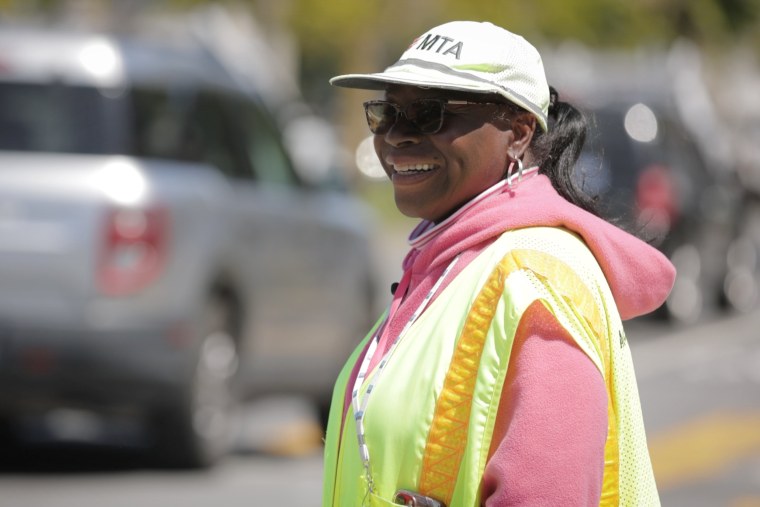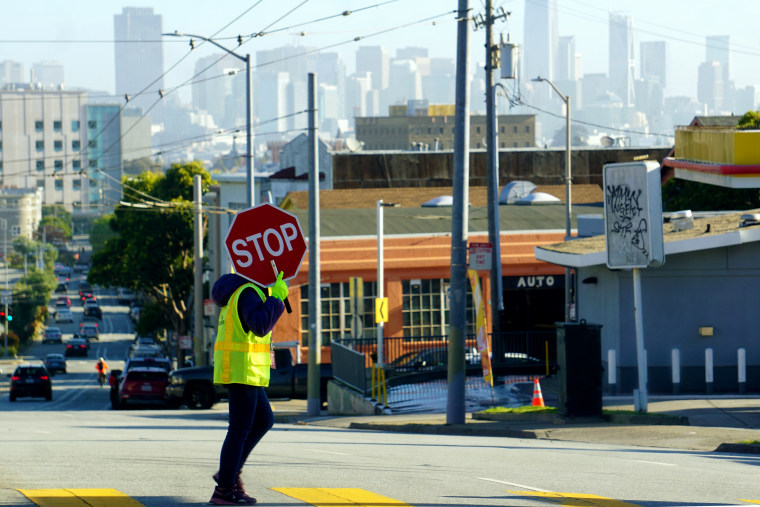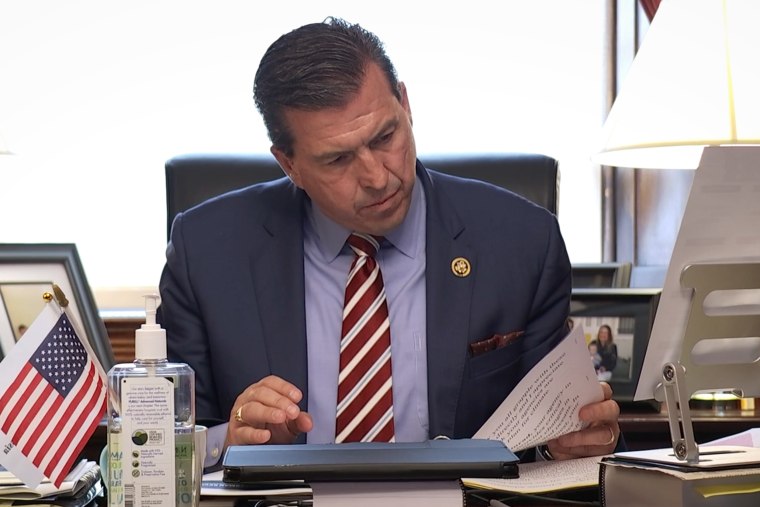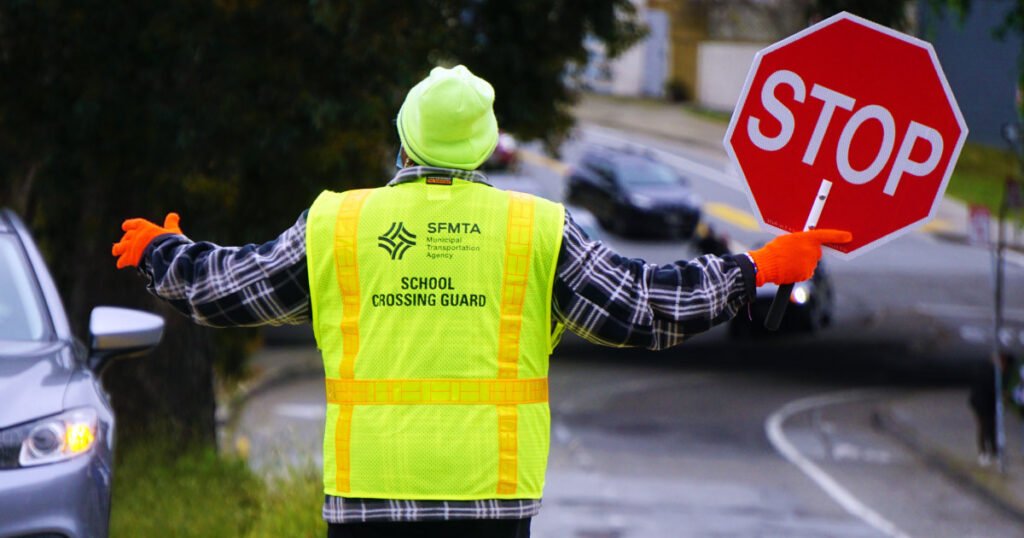Crossing guards say driverless cars nearly hit them in crosswalks
In San Francisco, one of the nation’s largest testing grounds for driverless vehicles, some school crossing guards say they have had to rush out of crosswalks to avoid being hit by self-driving cars.
“I just don’t think it’s very safe,” said Theresa Dorn, a school crossing guard for 11 years. Dorn says driverless vehicles operated by Waymo, which was spun off from Google in 2016, have nearly struck her on three separate occasions over the past year while she was guiding children and their families along crosswalks.
“The parent grabbed the child, looked at the car, and there was nobody driving it,” she said.
NBC News and NBC Bay Area interviewed 30 crossing guards stationed at more than 20 schools across San Francisco. Nearly 25%, about 1 in 4, said they had experienced some type of “close call” in the crosswalk with a Waymo driverless car, where either the vehicle suddenly hit the brakes to prevent a collision, or the crossing guard rushed out of the way to avoid being hit.
“It did not recognize me in the intersection,” said Dorn, who added that each of her near misses occurred while she was holding up her stop sign in the crosswalk.
“Why do they have these driverless cars?” she said. “I think somebody should be driving them.”

Waymo said that without specific details, such as the time and date of the incidents, it couldn’t explain what its cars may have done or why.
The company declined to be interviewed, but in a statement said it takes public concerns “very seriously,” adding “while we’re proud of our safety record, we also recognize the importance of ensuring that other road users feel confident and comfortable around our technology.”
Crossing guards describe ‘close calls’
Of the 30 crossing guards interviewed, all but Dorn spoke on the condition of anonymity since they, unlike Dorn, did not have permission from their employer, the San Francisco Municipal Transportation Agency, to speak publicly.
“I’ve almost been hit half a dozen times,” one crossing guard told us.
“I tell kids to stay back,” said another.
The close calls all occurred within the past year, those guards reporting them said, but they could not recall exact dates or times. None of them filed police reports about their near misses.
Waymo has been shuttling passengers with its autonomous cars since 2017, when it launched its ride-hailing service in Phoenix. The company has since dispatched driverless fleets to San Francisco, Los Angeles and Austin, Texas.
“We want to be good members of the communities we operate in and appreciate the ongoing dialogue we have with the other road users and regulators,” Waymo said in its statement.
A paper trail of near misses
Calculating the exact number of near misses involving driverless cars is impossible because the companies operating them are only legally required to disclose actual collisions. The California Department of Motor Vehicles and the National Highway Traffic Safety Administration (NHTSA) each maintain separate records regarding accidents reported by autonomous vehicle companies; those databases, however, do not include records involving near misses.
While driverless car companies are allowed to keep their close calls secret, there is a partial paper trail. Through a public records request, NBC News and NBC Bay Area obtained all autonomous vehicle complaints submitted last year to the California Department of Motor Vehicles, one of the state’s major regulators overseeing autonomous vehicles.
In 2023, the DMV fielded more than 200 complaints regarding driverless cars — roughly a quarter involved Waymo and the bulk of the rest concerning its competitor, Cruise, a subsidiary of General Motors.
About 30% of those complaints detailed safety concerns in crosswalks. Of those 62 complaints, nearly all included descriptions from people saying driverless cars nearly struck them in crosswalks.
“I’ve almost been hit,” said one complainant, recalling an incident with a Waymo driverless car.
“We had to hit the car with our hand before it stopped,” wrote another, referring to a Cruise autonomous vehicle in a crosswalk.

Cruise, like Waymo, also declined an interview request, but in a statement said safety is a “critical priority,” adding that its cars are “designed to detect, track and predict the behavior of road users, including pedestrians and cyclists.”
Cruise, which noted each of its vehicles are equipped with 360-degree cameras to “measure distances to objects and maintain visibility,” also said that it has a “dedicated team that investigates concerns … and the insights gathered help our [autonomous vehicles] improve.”
Up until late last year, Cruise was offering driverless rides in San Francisco, Phoenix, Austin and Dallas, but the company pulled its entire fleet of roughly 400 self-driving vehicles off the road last October amid accusations from California regulators that Cruise’s cars posed an “unreasonable risk to public safety.”
Those comments stemmed from an incident in San Francisco in which a pedestrian was struck by a human driver, tossing her into the path of a driverless Cruise car, which ran her over and then immediately came to a stop. Regulators with the California DMV and California Public Utilities Commission have accused Cruise of misleading them into thinking that is where the incident ended. Both agencies said they later learned that shortly after stopping, the Cruise vehicle then attempted to pull over to the curb, dragging the pedestrian about 20 feet after failing to recognize she was trapped underneath the vehicle.
Cruise, which is the subject of at least five separate investigations — by the California DMV and Public Utilities Commission, the National Highway Traffic Safety Administration, the U.S. Department of Justice and U.S. Securities and Exchange Commission — has repeatedly denied attempting to “purposely” mislead anyone, but company executives have acknowledged Cruise committed a series of “regrettable” missteps.
Most of the crossing guards interviewed said they had not encountered a close call with a driverless car, and some said they consistently found self-driving vehicles to be better drivers than humans.
One crossing guard said, “I’ve almost been hit by parents, not driverless cars.”
Autonomous vehicles have logged more than 70 million miles on public roadways across the U.S. and have been tested or operated in at least 19 states, according to the Autonomous Vehicle Industry Association.
Proponents of autonomous cars argue that they have the potential to prevent human-caused accidents.
In California, 35 companies are permitted to operate driverless vehicles in neighborhoods across the state. Most of those firms are still only approved to use their driverless cars for ongoing testing, but hundreds of autonomous vehicles in California are already being used commercially for ride-hailing services and food delivery.
Regardless of whether a human is behind the wheel, vehicles are still expected to follow the rules of the road. For example, cars must wait to drive through a crosswalk until all pedestrians are completely out of it, according to the California Highway Patrol. However, in cases where a concrete median separates both directions of traffic, cars are free to pass once pedestrians have cleared that side of the street.
NBC News’ previous reporting, however, has raised questions about how often driverless cars are complying, including when small children are involved.
Call for more oversight
State lawmakers in California as well as members of Congress are now echoing calls to enact more stringent reporting requirements for driverless car companies.
“Those kinds of incidents where people’s lives are put at risk — but it’s not reportable — we need to be looking at those,” said U.S. Rep. Kevin Mullin, D-Calif. “The data is crucial in crafting regulations that compel these companies to focus on these areas of safety concern.”
In April, Mullin sent a letter to NHTSA formally requesting that the agency begin forcing driverless car companies to reveal how often their vehicles are involved in near misses, not just collisions.
“You’ve identified some pretty discernible patterns,” Mullin said in reference to NBC News’ findings, which he called “concerning.”
“I will share what you found with my colleagues in Washington to see how we can use this information to keep pressure where we need to apply it.”

Officials with NHTSA said they are still in the process of drafting a response to Mullin’s letter and had no comment on the request. The agency, however, did note that it is actively working on six safety investigations into driverless car companies — one launched last October and another two months later involve Cruise. One of the agency’s newest investigations, however, centers on Waymo, which focuses on more than 30 incidents in which Waymo driverless vehicles were either involved in a collision or “potentially violated traffic safety laws.”
“NHTSA plays a very important role in road safety and we will continue to work with them as part of our mission to become the world’s most trusted driver,” Waymo said in a statement. The company added its driverless vehicles shuttle passengers about 50,000 times per week “in some of the most challenging and complex environments.”
Cruise, which also said it is cooperating with the ongoing investigations, noted in a statement it is “deeply committed to safety” and pledged to continue “engaging with regulators and stakeholders at all levels of government to help bring the benefits of autonomous vehicle technology to communities.”
While lawmakers, regulators and driverless car companies weigh in on what future requirements and restrictions should look like for autonomous vehicles, Dorn said she will keep her attention focused on her busy San Francisco intersection and the children she is trying to protect.
“My main concern is just making sure that they get to school safely and that they go back home safely,” Dorn said. “We have to be a little bit more cautious.”
You may be interested

Horoscope from July 27 to August 3: Predictions for Leo, Virgo, Libra and more
new admin - Jul 26, 2024Aries (Mar21/Apr20)A trip is being planned to visit the land of your ancestors or a place that holds special childhood…

Crews struggle to contain monster wildfire in California
new admin - Jul 26, 2024Crews struggle to contain monster wildfire in California - CBS News Watch CBS News The arson-sparked Park Fire burning near…

Dolphins, Tua Tagovailoa agree to record $212.4 million contract extension: reports
new admin - Jul 26, 2024[ad_1] After the best season of his career, Tua Tagovailoa isn't going anywhere.He and the Miami Dolphins have reportedly agreed…

































